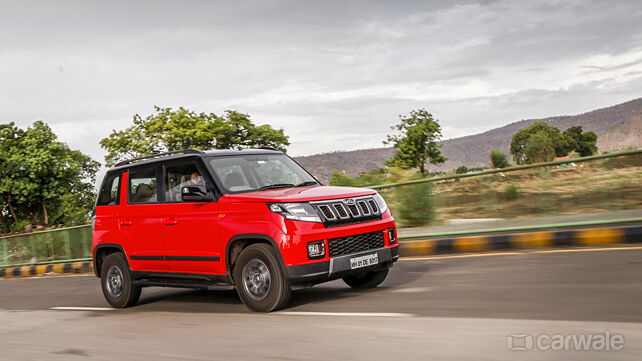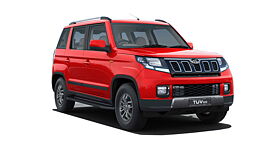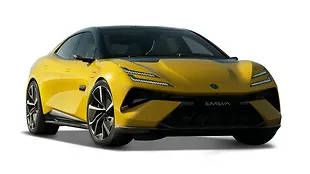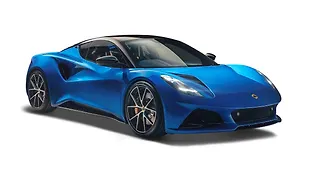What is it?

The 2019 Mahindra TUV300 seen here isn’t exactly a mid-life update. However, this is the first major facelift for TUV since its introduction half a decade ago. So now the boxy SUV from Mahindra’s stable has cosmetic tweaks both inside and out. And since the competition in the highly lucrative sub-four-metre SUV segment is heating up with hot new arrivals, this update for the TUV300 was a much-needed one. But have these changes made the Mahindra’s old-school sub-four metre SUV any better compared to its counterparts, or to its older self even? Let us find out.

In terms of styling, the five-slat grille now gets a piano-black finish. Also, there is a grille insert around the Mahindra logo finished in what Mahindra likes to call ‘black chrome’. There are new day-time-running lights, and they look really cool in its white illumination integrated into the smoked finished headlamps. Meanwhile, at the back, there are a new set of clear-lens tail lamps differentiating it from the older model whereas people with a keen eye will also notice the new ‘X-shaped’ spare wheel cover and a roof spoiler. Also, the bumpers get a faux skid plate with blacked out body cladding which runs along the side of the car this time. Apart from these changes, the TUV300 facelift now also gets two exterior colour options in addition to the existing ones – highway red and mystic copper. The former paint option looks handsome in metal especially with the dual-tone combination of black roof and greyish alloy wheels. All in all, the Mahindra TUV300 facelift is not a huge leap over the older model, but these requisite changes have lent it a fresh appeal to help it soldier on for a few more years.

How is it on the inside?

Inside, it is evident that the cabin hasn’t been tinkered with much. Mahindra wants us to believe that the silver accents all around the dashboard and on the door pads are new, however, it is nothing more than a different colour of silver finish compared to the previous model. But what’s hard to miss is the new seven-inch touchscreen infotainment system which now gets a reverse parking camera and navigation. That said, the dual-tone black-beige cabin feels airy and has good visibility all around. The thin A-pillar and large mirrors also bring about a commanding driving position which is more SUV-like compared to all the other monocoque-based rivals

We found the new upholstery of the updated TUV300 to be very impressive. It has a nice, soft feel to it with a faux quilted leather finish and we would definitely prefer it to the cloth or rexine upholstery. Apart from that, the driver height adjusts and lumbar support on both front seats provide comfortable seating for long distance commute. In terms of storage, the large and useful cubby holes in the centre console are more than sufficient, but we found the absence of any flat surface in the centre console to keep the phone or wallet rather inconvenient. All four door pad spaces are usable too and can hold a litre bottle easily. But then again, we think, the TUV300 can do a little better in terms of ergonomics so that all the buttons and switches can come to hand easily, especially while driving.

The seat at the back is a flat bench and it does take a little extra effort to get into them owing to the high ingress. And the limited knee room in the middle row makes things a little uncomfortable for taller people. Yet, what’s commendable is that the TUV300 can certainly fit three adults in the middle row. On the other hand, the high-set middle bench provides the occupants with a soaring outside view. But it needs to be mentioned that this rear bench lacks any kind of support for the passenger. Also the middle row – which does fold down flat – has an upright backrest angle. And so, it doesn’t have enough under-thigh support and hence isn’t a very comfortable place to be in.

But what’s still cramped are the jump seats at the back. Mahindra doesn’t provide seatbelts for the two passengers even now. And although it is the only vehicle in its class to provide this 5+2 setup, there just isn’t enough space for two adults to be comfortable. And what spoils the fun is that even with the jump seats folded up, the usable cargo space is narrow and has a tall loading lip compared to its counterparts.

In terms of equipment, the TUV300 now gets dual front airbags, ABS, rear parking sensors, Eco mode, speed alert system, steering adjust, and seat belt reminder as standard fitment. The fully loaded T10 (O) trim which we have here comes kitted with electric mirrors, storage space below driver’s seat, armrest, two 12V sockets, follow-me-home lamps, four speakers with two twitters, new flip key, rear wiper/washer, engine start-stop function, and lumbar support. The connectivity includes Bluetooth, AUX and USB, however, it misses out on Apple CarPlay and Android Auto.

How does it drive?

This is merely a facelift, so there are no drastic changes in terms of powertrain except that the 1.5-litre, three-cylinder mHawk100 diesel is now only available in the more powerful 100bhp output. Which means there is no 84bhp version now and Mahindra has also discontinued the AMT gearbox option. So the sole transmission option is the five-speed manual which sends power to rear wheels.
Upon turning on the ignition, there is barely any clatter from the diesel engine at idle or even off-the-line. Combine it with a light clutch and 240Nm of twisting force and the TUV300 feels like a very easy car to drive. This 1.5-litre diesel is, undoubtedly, refined, but one can argue that today you can have similarly priced compact SUVs that are powered by quieter engines.

Off the mark, the half-clutch action is smooth and there is an abundant amount of torque right from the word go. Getting on the throttle, the engine feels very tractable and refined for a three-cylinder. There’s ample amount of grunt between 1,500 and 2,800rpm and the TUV pulls easily in any gear. There’s little to none turbo lag, the power delivery and throttle response is linear and the car accelerates with urgency the moment you put the foot down, provided the engine is kept in the mid-range. Keep the throttle pinned and the engine runs out of steam close to 4,000rpm where it just makes a coarse noise without any go. So to get the best out of the engine, the TUV should be short shifted and driven in the mid-range. The combination of the torquey engine and well-balanced gear ratios also reduce the need for constant gearshifts. In fact, one can keep the SUV in the third or four gear all day. Which brings us to the gearbox. Despite the long throws, this gearbox is convenient to operate - especially if you compare it with the Mahindras of yesteryears.
However, all things considered, the ladder-on-frame construction isn’t the best combination for driving dynamics. Sure, the TUV300 is relaxed, can do long distances without breaking a sweat and will easily haul weights. But for quick driving, or enthusiastic overtakes, the TUV isn’t the one for it. The best way is to drive this Mahindra calmly as it absorbs every bad road you can possibly throw in its path.

Considering its body-on-frame construction, the TUV300 has noticeable body roll. Which is understandable given its boxy body and high ground clearance. The steering is vague, off the centre, and it tends to feel heavy at low speeds and while parking. But it gets better as soon as the car gets going.
And finally, the body-on-ladder has its advantages too. The TUV doesn’t bother with potholes, speed breakers or even badly paved roads. It isn’t flat while going over the rough patches. In fact, there are more than required jiggles when going over undulating surfaces. But never would it thud nor would you feel the sharp edges inside the cabin. Also, it can cruise at legal highway speeds with ease but anything above that and the TUV starts to feel skittish and doesn’t inspire enough confidence.

Should I buy one?

The Mahindra TUV300 after the cosmetic changes looks slightly better than the plain-Jane design of the older model. And with the added equipment, it is up to the mark with all the other rivals. However, it isn’t exactly an urban, modern-day city car. The other sub-four metre SUV from Mahindra’s stable – the XUV300 is the better choice for that. So then the TUV300 comes as the best bet for someone who regularly commutes over beaten paths, or has to frequently shuttle five-six people over longer distances. No wonder the TUV is a popular choice in tier 2 and tier 3 cities rather than metropolises. Its ladder-frame construction makes it a proper SUV with go-anywhere capabilities and it is the only one with a 5+2 seating in its class. Sure, the price tag of Rs 10.56 lakhs ex-showroom for this top-of-the-line trim isn’t exactly cheap. In fact, if the on-road price of this very variant is to be considered, it is quite close to several compact SUVs on sale in India that offer much better value.
Where does it fit in?

The Mahindra TUV300 carries a sticker price that ranges from Rs 8.54 lakhs to Rs 10.56 lakhs ex-showroom. And that puts it in the competition where it locks horns with the likes of Maruti Suzuki Vitara Brezza, Ford EcoSport, Tata Nexon, Mahindra XUV300 and the new-comer Hyundai Venue. All these cars feel like a raised hatchback, while the TUV feels like a scaled down SUV, which says a lot about it.
Pictures – Kaustubh Gandhi


































